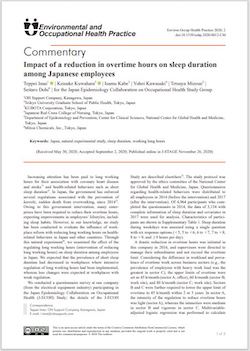#E0019 Impact of a reduction in overtime hours on sleep duration among Japanese employees

Reduced Working Hours Insufficient for Improving the Sleep Durations of Japanese Employees
Working long hours has been shown to negatively affect sleeping patterns and increase the likelihood of coronary heart disease and strokes. Japanese employees are known for working longer hours, which has led to “Karoshi”, or death from overwork, in several cases. The government has since mandated that companies curtail overtime hours and introduce measures to improve workers’ lifestyles. To investigate how workplace reforms have affected the health of employees, we examined the sleep duration in workers before and after the policy came into being.
We sent out a questionnaire survey to employees of an electrical firm before and after it instituted reforms to reduce working hours. Of the more than 3000 people who responded, we found that short sleep durations increased only slightly over three years. The reforms did not remarkably improve sleep habits, a finding that contradicts an earlier study which showed a positive link between long working hours and short sleeping hours. From our findings, it also appeared that the slight increase in sleeping time was unaffected by the new rules and may have had more to do with the aging process because the older we get, the more sleep we seem to require.
Our research suggests that a reduction in working hours may not by itself bring about lifestyle changes in Japanese employees. Employers may have to consider a host of other measures such as educating workers on the importance of sleep practices. Further studies with longer follow-up periods will also help in outlining methods to improve employee health and wellbeing.

Link to the original journal article:
https://www.jstage.jst.go.jp/article/eohp/2/1/2_2020-0012-CM/_article
Title of the paper:
Impact of a reduction in overtime hours on sleep duration among Japanese employees
Authors:
Teppei Imai, Keisuke Kuwahara, Isamu Kabe, Yohei Kawasaki, Tetsuya Mizoue, Seitaro Dohi




